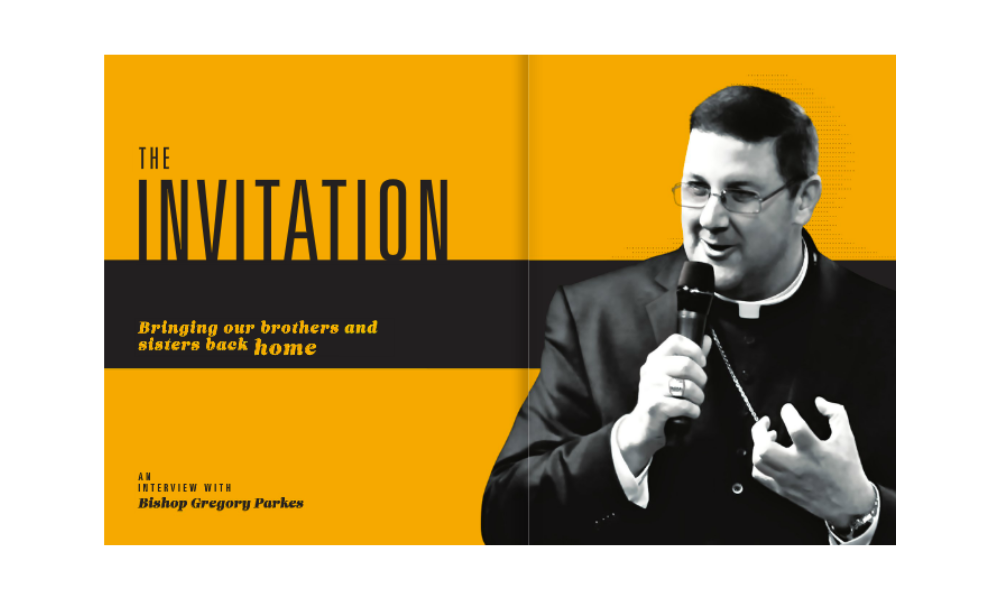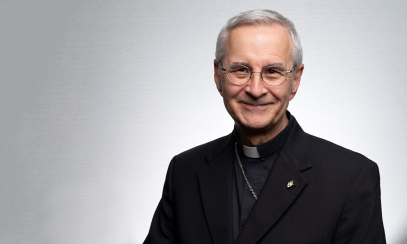
The Invitation
While serving as Bishop of Tallahassee, Florida, Bishop Gregory L. Parkes shared with CE his view that evangelization begins with an invitation.
CE: What are the most challenging issues facing evangelization for you and for our Church in the U.S.?
+GP: We’ve recently conducted “Listening Sessions” across our diocese to help determine a mutually shared vision for the future of our Church. In these 10 live sessions, and in the corresponding online survey submittals, it is clear that we face both a challenge and have an opportunity to reach those who have left the practice of their Catholic faith behind, either for another denomination or simply for no religious practice at all. The faithful are deeply concerned about their brothers, sisters, children and grandchildren who have drifted away. We earnestly want to welcome them back, but are often unsure of how to approach this mission.
One of the first concerns we have is how to identify those who have left. As a group, we Catholics tend to be rather reticent about asking others about their faith lives. We’re unsure where to start when we do find a family member, friend, neighbor or acquaintance who may be searching for a “church home.” Sometimes, we lack the best information about what we as Catholics believe, how to communicate that to others, and how to dispel the misconceptions about our faith, even among Catholics. We’re uncertain of how best to address and comfort those who have left the Church due to a past hurt. The most effective way to begin evangelizing is simply to invite – invite family members, friends and acquaintances to a parish supper, to a Bible study or to Mass.
A personal invitation followed by a warm welcome is the single most compelling way to evangelize.
CE: How important is your publication to your communications and evangelization efforts?
+GP: The Catholic Compass is vital. It reaches into nearly every household of our diocese, sharing inspiring stories of how ordinary Catholics in our midst live extraordinary lives of faith and service to God’s people. It provides an avenue to open up the Church’s teachings, empowering those who would share their faith with others. It creates for us a common bond, building a sense of membership in the larger Church beyond the parish. It helps to welcome new members, giving them an increased feeling of belonging. It reaches the homebound and those in nursing homes and hospitals, letting them know they are always connected with their faith family. It affords us a gentle, yet effective, means of evangelization, as the magazine is passed along from one reader to the next, often reaching beyond the original household in which it is read. In addition to the print copy of the magazine, our outreach is extended by the online version and most recently, the app, which allows people to take the content wherever they go and quickly and easily share it with friends and family. The Catholic Compass is a very important part of our communication and evangelization strategy.
CE: What do you find most challenging about using technology as a bishop to communicate?
+GP: Probably the most daunting aspect of using technology as a bishop is staying abreast of the new applications and tools. The proliferation of apps, for example, multiplies the opportunities to communicate daily, hourly, even minute by minute, if one chooses. One challenge is trying to stay ahead of who is using which applications to connect, and the most effective ways to reach out to various demographics to share the Gospel message. And, of course, concomitant with that is the allocation of resources, both human and technological, to keep the message flowing. Personally, I regularly post to Facebook, and often to Twitter, but I’m always interested in learning what other means people are using to connect, especially to our younger Catholics.
CE: How can media professionals better help their bishops?
+GP: It takes a team to keep a relevant, fresh, engaging message coming from the Church and reaching its target. Media professionals are, of course, a key part of this team, always being alert to new opportunities to spread the Gospel. It’s critical for media professionals, and all others who minister in the Church, to actively listen to the faithful, in addition to enthusiastically communicating the Gospel message. It’s vitally important to understand with whom we’re communicating, and how to reach them, in order to achieve the best results. An effective media professional gives advice and counsel to a bishop to help make his connections with the faithful and the larger community as effective as possible.



